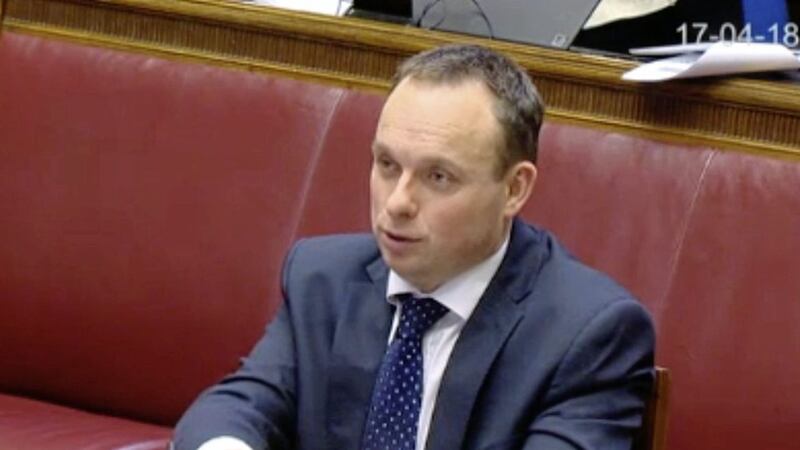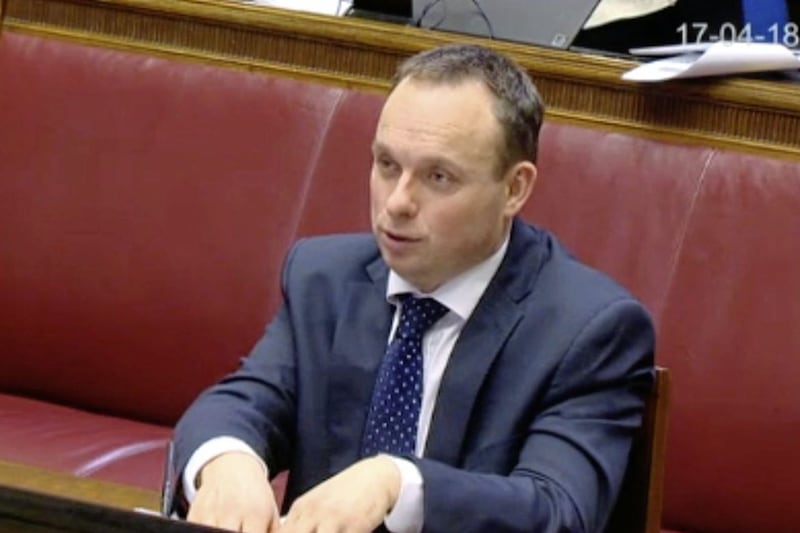ANDREW CRAWFORD
Former DUP special adviser Andrew Crawford gave confidential information to his family and other "external parties" about the Renewable Heat Incentive scheme and suggested amendments which would have benefited poultry farmers.
The report reserved its strongest criticism for the former Spad.
Chair Sir Patrick Coghlin said it was "totally unacceptable" that Mr Crawford had passed on information, which included a confidential draft of a consultation document in 2013, weeks before it was released to the public.
He was also criticised for failing to declare that he had family members involved in the scheme - his brother James and two cousins who had 11 biomass boilers between them - and his close links with the poultry industry.
The clear conflict of interest meant he should not have been involved on advising on a key government document about the poultry industry's significant contribution to the RHI overspend.
Mr Crawford, a special adviser to finance minister Arlene Foster, was also strongly criticised for not telling her in July 2015 that there would be a "massive spike" in applications and for not making her aware that the tariffs were being exploited to earn money.
He was also censured for suggesting an amendment to cost controls in July 2015 which, if implemented, would still have made the scheme "overgenerous to participants, and to poultry farmers in particular".
The report found that Mr Crawford's suggestions were aimed at benefitting poultry farmers and indirectly poultry giant Moy Park.
However, despite conflicting testimony from senior civil servant Dr Andrew McCormick and Mr Crawford, the report found the former special adviser "did not deliberately delay the introduction of cost controls".
ARLENE FOSTER
Mrs Foster introduced the scheme when she was enterprise minister.
She told the inquiry she had not read the regulations before bringing them to the assembly - an omission criticised in the report "not least because in the inquiry's view to do so is a core part of a minister’s job".
Mrs Foster and Mr Crawford should have "taken a more active interest in the development of the regulations", the report found, which would have allowed them to see that no form of budget control had been included.
The DUP leader's poor level of communication with Mr Crawford was also highlighted as "so weak" that he did not tell her he had not read technical reports and she did not ask him, even though she thought this was part of his job.
The report found that either Mrs Foster or Mr Crawford should have asked for a draft 2011 report carried out by a consultancy firm into how best to run the scheme.
The consultancy report highlighted one approach - a Challenge Fund - as the best option.
However, the inquiry also found that she was not explicitly told about the Challenge Fund which could have saved up to £300 million in subsidies.
The inquiry also found that Mrs Foster was not given enough information and that senior civil servant Fiona Hepper did not properly explain to Mrs Foster that the scheme posed a risk to her department's budget.
She also should have been told in March 2012 that the predicted cost of the scheme had risen from £334 million to £445 million.
Mrs Foster, now the first minister, yesterday apologised for her "failings in the implementation" of the RHI scheme.
She added that she is "determined to learn from my mistakes and to work to ensure that the mistakes and systematic failures of the past are not repeated".
JONATHAN BELL AND TIMOTHY CAIRNS
When Jonathan Bell became energy minister he felt he had no choice but to accept the appointment of his special adviser, Timothy Cairns, a situation that “fundamentally undermined” the personal nature of the appointment and the high degree of trust required.
A breakdown in trust between Mr Bell and Mr Cairns made resolving problems with the Renewable Heat Incentive scheme "more difficult", the report found.
While Mr Bell's testimony was among the most striking of all the witnesses to the inquiry, his role in the scheme only merited a few paragraphs in the inquiry's findings.
The inquiry found no objective evidence to support Mr Bell’s allegation that Mr Cairns intervened to keep RHI matters off the agenda at meetings.
Submissions to close the scheme early in 2016 were discussed between Mr Bell and his special adviser, the report found. But a collective lack of clear leadership led to “unnecessary delay” in clearing submissions.
TIMOTHY JOHNSTON
The DUP chief executive, then a senior special adviser, was described by Mr Cairns as the most important person in the party after Mrs Foster.
While the inquiry found Mr Johnston did not try to delay the implementation of cost controls in 2015, it criticised his admission that he had not bothered to read a key submission on introducing controls.
The report said the omission "was not very impressive on his part" given that he was the special adviser to the first minister and the submission was about a need to control public spending.
It also found that Mr Johnston was much more involved in the RHI scheme discussions, including on tariff controls, than his evidence to the inquiry suggested.
In a statement released through his solicitor, Mr Johnston said: "While I am disappointed that the inquiry panel, on balance, did not find in my favour on some aspects of my evidence I was grateful for the opportunity to set out my clear recollection of the events at that time.
"The arrangements set up by me between Dr Crawford and Mr Cairns were not intended or foreseen by me as a process to delay the implementation of cost controls."
MÁIRTÍN Ó MUILLEOIR
The former finance minister sought permission from unelected party official Ted Howell before he acted over the cash-for-ash scheme.
Mr Howell had been brought out of retirement by the late Martin McGuinness to chair a Sinn Féin 'crisis committee' to deal with an emerging political crisis in January 2017.
Mr Ó Muilleoir denied that he had asked Mr Howell for permission but the inquiry found that the wording of an email "encompassed seeking Mr Howell’s consent to the proposed course of action by an executive minister".
"The inquiry is conscious that the evidence that it received from Minister Ó Muilleoir was received in the course of an inquiry instituted in order to restore public confidence in the workings of government. Transparency and accountability are key elements in maintaining such confidence."
FIONA HEPPER
Ms Hepper was head of the energy division in the Department of Enterprise, Trade and Investment, which ran the RHI scheme.
The report found there was "absolutely no doubt" that she and the department's head of finance Trevor Cooper were aware in 2011 that any RHI overspend would affect the department's budget.
The senior civil servant told the inquiry she was "pretty sure" she had told Mrs Foster about potential funding issues with the scheme.
However, that information was never included in any formal submission - an omission which Ms Hepper herself admitted was "unhelpful".
The inquiry ultimately found it was unlikely that Ms Hepper "adequately and effectively" explained to Mrs Foster the potential risk to Stormont's budget.
"Not ensuring that the minister clearly understood the risk to the departmental expenditure limit budget is likely to have significantly reduced the appreciation of the necessity for budget control mechanisms," the report found.
JANETTE O'HAGAN
The Antrim businesswoman repeatedly contacted DETI officials and Arlene Foster attempting to raise concerns about RHI, but her warnings were overlooked.
She was singled out for praise in the report, being described as an "impressive witness" and her evidence was "clearly and rationally presented".
The report said it "was not difficult to sympathise with her sense of frustration at the apparent inaction of a government department".
"The treatment of this individual and of her attempts at communicating her concerns to the department fell well below the standard she was entitled to expect," it added.
OTHER CIVIL SERVANTS
Inadequate resources and expertise were allocated to RHI by the Department of Enterprise, Trade and Investment (DETI), with civil servants handling the scheme left "consistently under-resourced".
DETI's "wholesale and uncoordinated" changeover of staff in 2013/14 working in RHI "should not have been allowed to happen".
When problems with RHI were recognised within DETI in summer 2015, the interventions of senior civil servants were "not sufficiently directed or effective".
Too much information about proposed changes to RHI were shared by DETI with third parties, and the extent of information passed by junior officials was "inappropriate" and "revealed a lack of commercial awareness".
A policy in the NI Civil Service of deploying "generalist" officials without considering the needs of certain roles also contributed to problems.
Basic administration and record-keeping was too often lacking within DETI, including several important meetings with ministers.
A "silo culture" between Stormont departments also undermined the protection of public funds.
OTHER SPECIAL ADVISERS
Among the instances of "unacceptable behaviour" by special advisers was in 2017 when the DUP's John Robinson, Andrew Crawford and Richard Bullick and economy minister Simon Hamilton were involved in the leaking of civil servants' emails to divert attention from their party.
The report said that all three Spads were to some extent "participants in this action" but it was "a quite extraordinary and unacceptable step for an executive minister to also acquiesce".
There was also a "repeated failure" to comply with legislation on the appointment and conduct of Spads.
No effective system was in force for Spads to register their interests and there was no adequate requirement or instruction telling them to do this.








